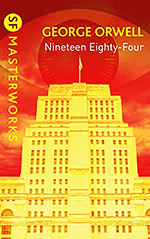
![]() Bormgans
Bormgans
3/17/2023
![]()
I can understand the cultural significance of this book -- it's so significant I don't need to explain to you what this book is about: you know.
That might be one of the reasons I felt this to be utterly boring: I don't think I learned a thing, it all felt so familiar, generic even.
Because of its central place in the Western literary canon, my feelings about 1984 are hard to parse. Might I have loved this if I hadn't known so much about it? If I'd read it when it first came out?
I'm not so sure. It felt like Orwell was preaching the entire time, and I generally don't like MESSAGE literature. I didn't like Bradbury's Fahrenheit 451, and Atwood's The Handmaid's Tale didn't feel fully realistic either.
Another issue: I didn't buy Orwell's future world. It seemed so binary -- everything in service of Orwell's didactics. I missed the path towards the state of affairs described: such a path would be complex & interesting, but Orwell basically reduces the Ingsoc state system to a bad boogeyman, and the motivations of the characters that installed and sustain this system aren't really explored. Indeed: I missed a certain kind of depth.
I know I'm in a minority position. The cultural norm is to like books that are against totalitarianism: over 4 million ratings on Goodreads, with a 4.19 average. Most dissident voices on Goodreads -- the one and two star reviews -- say the same: not enough story, too much essay, bland characters, heavy-handed exposition, a cartoon villain.
That said: what Orwell does extremely well is illustrate blatant lies as a powerful political method.
Next!
ps -- For those of you who don't read the comments, somebody posted a link to a 1984 review Isaac Asimov wrote in 1980. Asimov is highly critical, and raises interesting points. Definitely worth your time. Check the link on my blog.
More reviews on Weighing A Pig Doesn't Fatten It.
https://schicksalgemeinschaft.wordpress.com/2023/03/15/nineteen-eighty-four-george-orwell-1949/